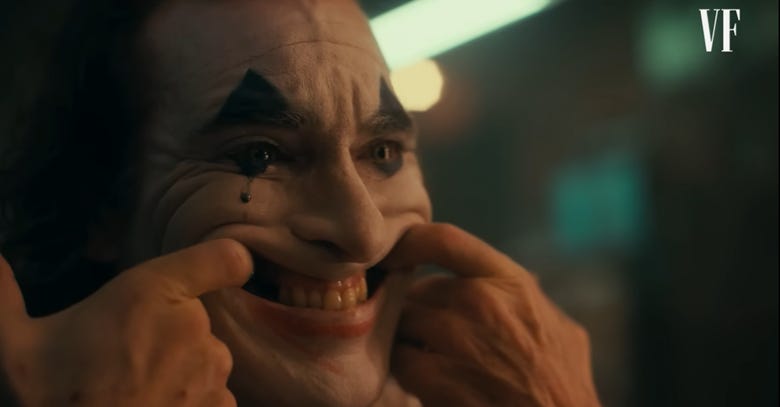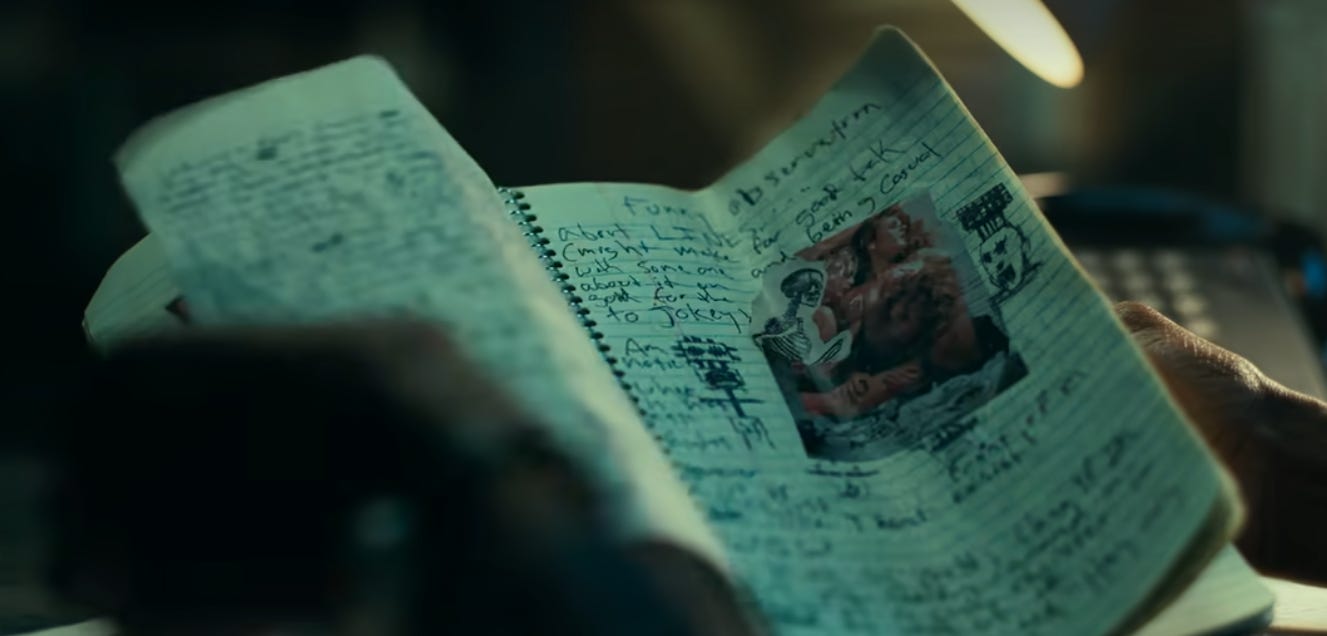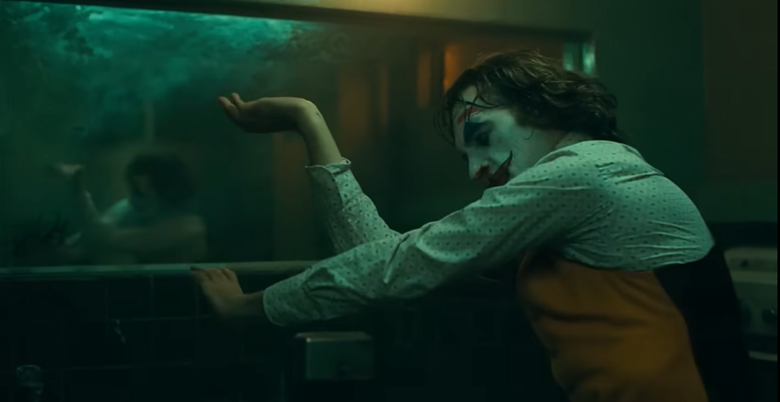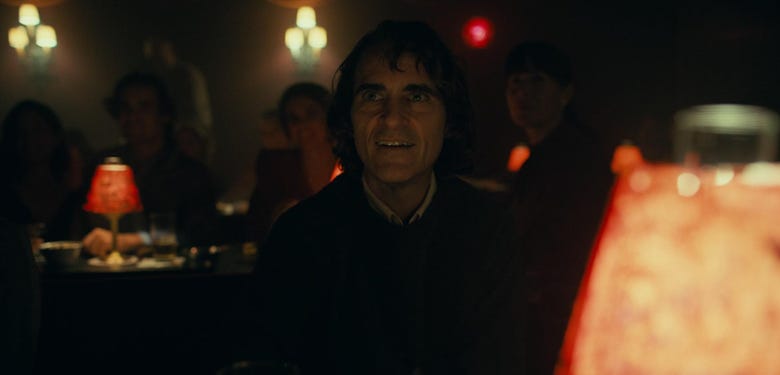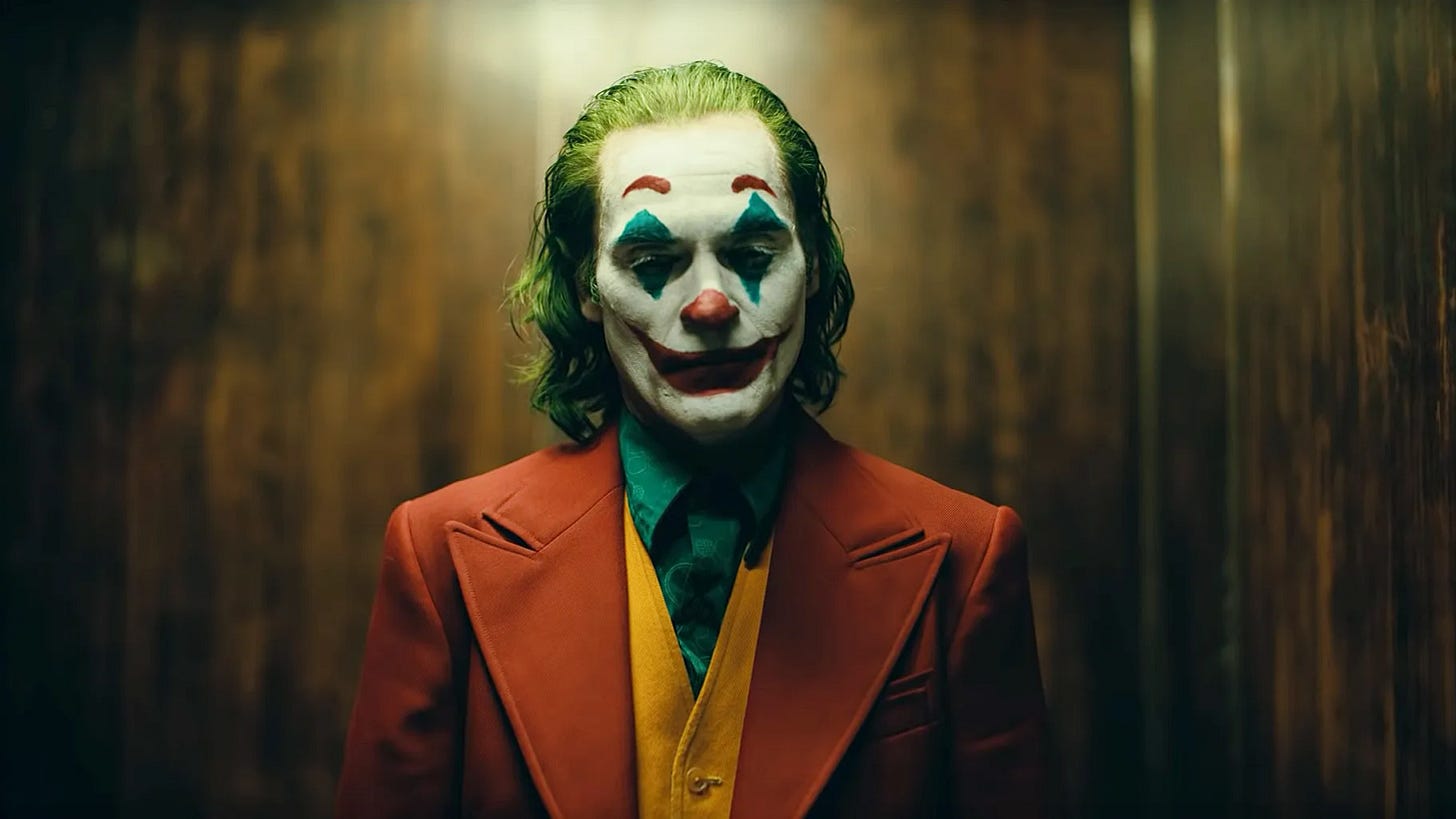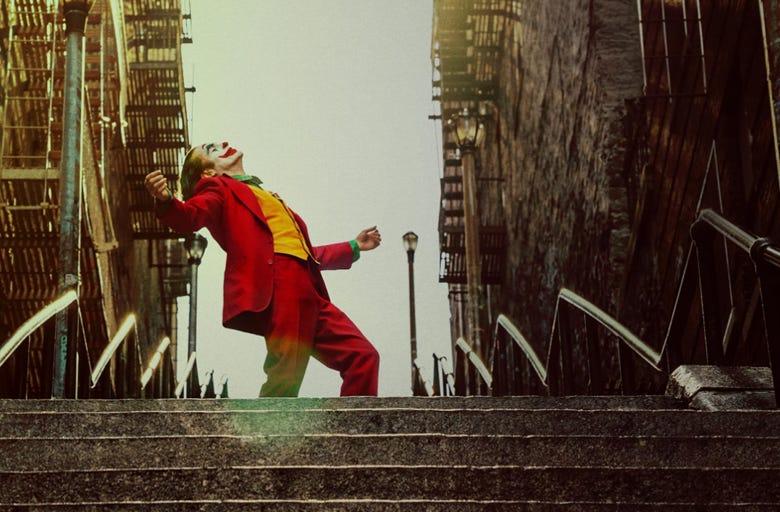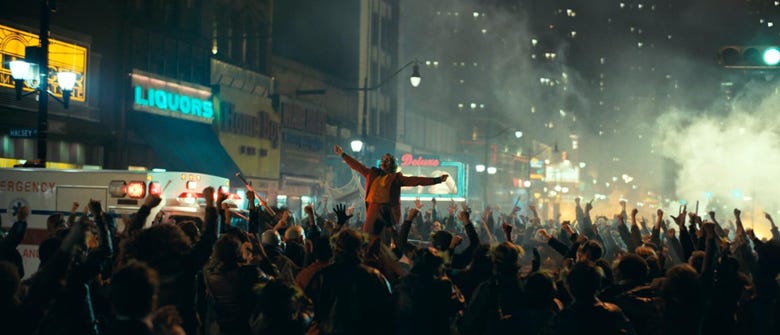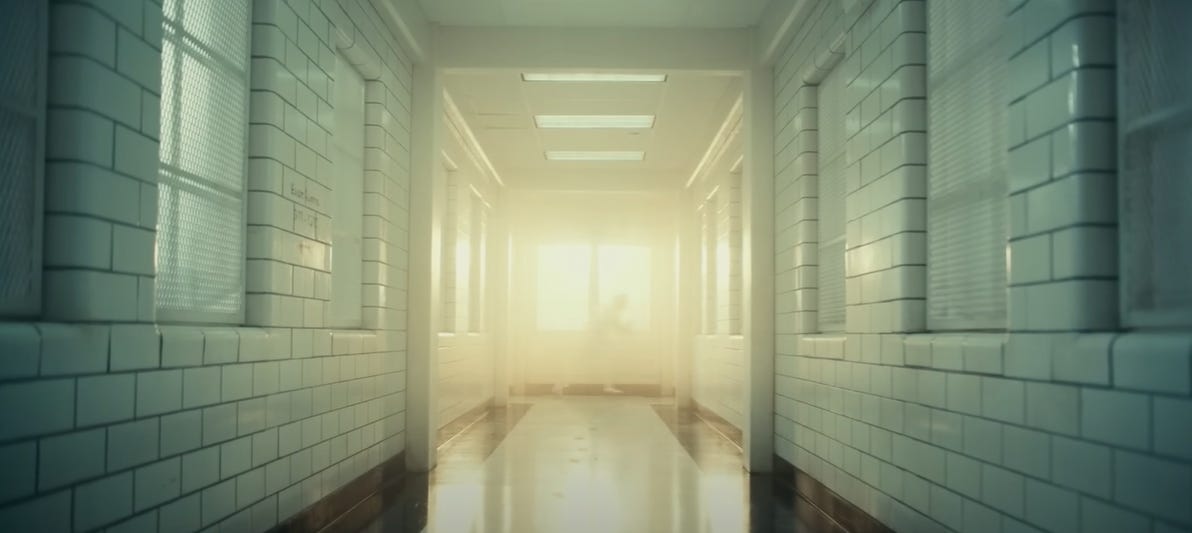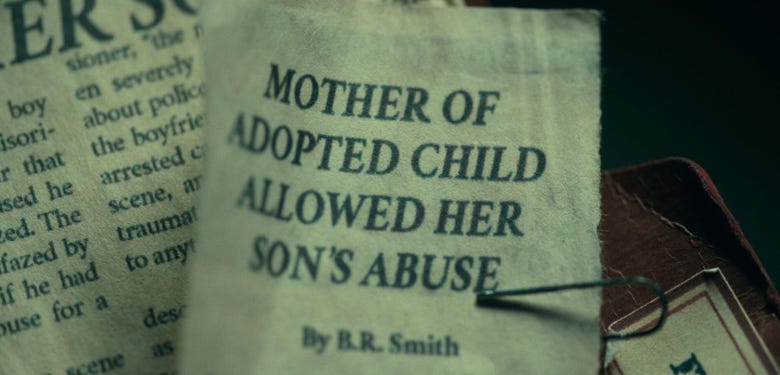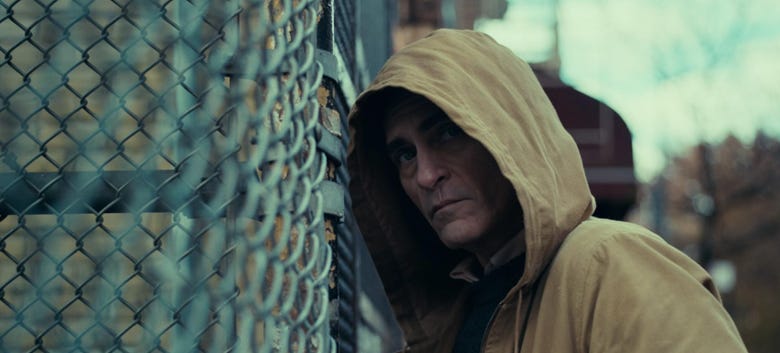[Re]watching Joker
tw: blood, violence and assault
I hadn’t watched the entirety of this film in one sitting when it was first released because I never felt like I was in the right headspace for it. I wonder how many people can make that discretion for themselves.
Rewatching Joker made me appreciate Phoenix's performance, the background score, the direction, and cinematography. Along with this came fear seeing the narrative young boys choose to take back from movies like this and a deep disappointment for the way women have been portrayed.
In Praise of The Performance
The opening scene was almost too painful to watch. We see Arthur putting on his clown makeup and forcing a smile in front of the mirror. Even the vast amount of memes and 'Behind every smile, there is a pain you know nothing about' posts on Instagram I’ve seen over the years, Phoenix's performance shuts everything out. We witness a moment so vulnerable; one instantly empathises with him. When the boys bully him and physically assault him, the only thing I could think of was: how cruel.
Throughout the film, Arthur keeps laughing at unnecessary moments because of the neurological condition he has. Sometimes, it starts as actual laughter, a scoff or a chuckle. Sometimes, he’s crying (like in the train scene) and these are extremely painful to watch. In some scenes, especially the first scene with the therapist I couldn’t help but notice how it feels like how he's retching out his laughter while the therapist watches passively.
The first time we’re introduced to his mental health journal which he turns into a joke diary is in the therapist’s scene. Usually when there are scenes in a film with written words on them, I peer. If I can, I pause the screen to read. At first, the same curiosity for the written word fills me. Would it be easier to breakdown a person's suffering, a person's mental illness if we were given glimpses of how it worked? Isn't all written word, a documentation of thought process, whether or not it is forged? A few seconds pass by and we see glimpses of the pornographic images of women stuck on his notebook and violent scribbles in black or blue ink. All of a sudden, I no longer want to look at Arthur's joke-diary on the screen.
I was very interested in his handwriting. Arthur writes with his left hand. His words are jagged, never quite on the lines of the notebook and misspelt—a true reflection of his mind. The book by itself is bent in half, yet holding itself together.
The film progresses and we see how he cares for his mother, switches on the TV and watches Murray Franklin’s show in awe. Arthur develops a parasocial relationship with Murray Franklin, imagines entire sequences in his head, which we see developing into full blown delusions. The absence of a father in his life, the extreme loneliness and his mental illness are all reflected in the way he maladaptively daydreams. He imagines Franklin standing up for him when the crowd laughs at him. He imagines Franklin offering him a moment on stage, claiming he’d give up all his fame for a son like Arthur. He doesn’t just see Murray Franklin as a friend, an idol or a celebrity. He sees him as a father figure.
Another defining scene for me was his scene with Hoyt. He has an eerie smile while Hoyt goes on in the background about how the others don't feel comfortable around him. We know he's mentally ill and there's empathy towards his condition but for a moment it turns into fear.
One can’t ignore how malnourished Arthur Fleck is throughout the movie. His shoulder bones prod out of his flesh, his spine dangerously protrudes outward his skin and his ribs are clearly visible. His movements are emaciated, I wouldn’t call them awkward. It’s freeing in some way. For a moment i thought of an emaciated swan stretching out its wings for the first time. There's nothing sinister about this.
This scene is also Hildur Guðnadóttir at her prime. Listening to the cello (or some other stringed instrument of the violin family) always makes me sad. A single slow stringing and I feel something lurching out of my chest. Here, it sounds worse.
A scene that really pained me to watch was the scene where he watches another standup comedian perform and takes down notes on his joke-diary.
He notes down what’s funny, the things making the crowd laugh. He himself laughs too early, never with the rest of the crowd. What was heartbreaking about this scene was how he’s really trying. In the past, we see him really trying, taking his medicines, carrying around the card that explains his condition, telling his mother not to worry about money. At some point, before everything went downhill, Arthur Fleck really tried to be better. Nothing breaks my heart more than this scene.
The film progresses.
The elevator scene is when it all turns around. For the first time, he seems sinister. Not when he killed the boys in the subway. Not when he killed his mother. Not when he killed Randall. Here.
This morbid smirk from inside the lift shifts into Arthur’s famous dance on the stairs. We see him grudging past these very stairs throughout the movie. Those were moments when we feel sad for him. That is long gone now.
We have three kinds of music playing throughout this sequence. We begin with the rock music that starts just as he enters the lift. For the first time, his back isn't hunched. He doesn’t look emaciated as he has before. His spine is straight, his steps are firm yet slippery in what I would call grace for lack of a better word.
There's nothing comical about the dance, despite the steps, despite his clown attire. He's got flair, he looks almost cool this way. That's why it's so scary. This lasts a while before the rock music turns into the cello's mellow and sinister tune.
Arthur spins, kicks his legs, tosses his cigarette with a casual flick of his hand. He laughs as he jumps down the stairs, water splashing around him. His eyes closed, another cigarette held between his lips, he's basking in the aftermath.
In this moment, even if brief, he is infinite. And even that is torn away from him in a second. The music switches when the detectives notice him. Here, Arthur’s first instinct is to run. We see him in a moment of brief victory or glory only to remind us that at the end of the day, he's going to have to keep running away if he has to survive.
This constant push and pull of his mental state is what makes him so unpredictable. Throughout the movie, he reaches several (of what seems like) pinnacles of doing something awful, something violent. I think, okay this is the worse he could go. He revels in it. He breaks down into tears. A wave of empathy washes over me. Just then, he lifts his face into an eery smile.
From the dance scene, it shifts to the fight with the detectives. Once again, he walks away from the chaos with a cigarette in hand and glass in his eyes. He looks sinister, no question. A few minutes later, he watches the news from Murray’s green room and we witness Arthur tearing up a little. Once again, briefly, he turns human.
Right before he enters Murray’s stage, Arthur is seen standing behind the colourful curtains. He moves his arms and this time, his movements no longer look like a dance. There is none of the semblances of grace there was before. His movements are utterly shattered. Like jagged pieces of bones moving to the sound of nails scratching a wall.
The moment he enters the stage, he enters with an introductory dance that looks exactly how you'd expect a stylish clown dance to look like. It's even more perfect than the first time we see him dance by the streets with the sign. He's truly become Joker. In an interview with Variety, Todd Philips talks about how he imagined Arthur having music within him. We witness that most prominently in this scene.
In the end, amidst the mob, Arthur finally has what he has always wanted. A crowd cheering for him. And he does what he always believed he was put on this earth for, gives the people a wide smile. A smile with teeth covered in blood.
In the final scene with the therapist, Arthur walks away with bloodstained, staggering feet. He gives a final dance in the light. Yet again, with people chasing him down in the end. I think it’s important to remember that the last that we see of him, we see him running away from two men. He is no hero here.
One thing I noticed throughout the movie and appreciate, is that every time we are on the verge of looking at Arthur as a hero or he basks in the aftermath of his violence, Todd Philips snatches that away from him as though (hopefully) reiterating that there’s nothing glorious about a man like him.
The Women of Joker
Who are the women in this movie? We have Penny (Arthur’s mother), Sophie Dumond, Dr. Sally, the two therapists and the woman on the bus. And the pornographic cut outs pasted in his notebook.
We’re introduced to the woman on the bus first. Her son faces Arthur and laughs at him making silly faces. The mother asks Arthur to stop. This is a completely reasonable reaction of a mother trying to protect her son in a city like Gotham. Do we really have a reason in this scene to look at her and think she’s horrible for shushing Arthur?
Next, we have Arthur’s mother. Penny is an old woman whom Arthur takes great care of. We hear that she told Arthur he was born to put a smile on people’s faces in this miserable, cold world. This is something we see Arthur struggling with in the entire film, going so far as to write it on his mirrors and keep pulling his face into reluctant smiles.
Earlier in the film, Arthur learns from Penny’s letter that he was born to her and Thomas Wayne. We want to think of Arthur as a guy that really loved his mother and was doing his best to take better care of her. But is he really? In the scene where he confronts her about his birth, we see Penny rushing into the washroom and locking it behind her. She says she’ll come out only after he stops being angry. One is left wondering what may have happened in the past that led her to say something like that. What does Arthur do when he is angry?
As the film progresses, Penny is hospitalised and Arthur is still tending to her. That is, until he finds her records from Arkham State Hospital. It is revealed that Penny herself suffered with mental illnesses and had an abusive partner who used to physically abuse Arthur when he was younger, while she just let it happen. Penny is held more accountable for the abuse Arthur faced than the abuser himself.
Penny was delusional and genuinely believed that she and Thomas Wayne were in love and that Arthur was born to them. Over the years, we wonder how many letters she had written to Thomas Wayne in this belief, making Arthur himself post them away. Arthur goes on to choke Penny to death in the hospital room and feels no remorse doing it.
We also have Sophie Dumond. She lives across the corridor in his apartment and intrigued by her, Arthur stalks her (the version of her in his head likes it) and they eventually end up going on a lovely date together.
He imagines her by his side when his mother gets hospitalised, placing a comforting hand, gently running over his hunched body. We realise all of this was a delusion when he enters her apartment one night only for her to request him to leave. After this scene, we watch Arthur walking out of her apartment with sombre music in the background, the camera close to the back of his head. What happened to her? I can only assume the worse.
Next is Dr. Sally. She is one of the guests present in Franklin’s show when Arthur is called to attend the Murray Franklin Show. After his introductory dance while entering the stage, he shakes hands with Franklin, walks over to Dr. Sally and forces himself upon her. He presses his mouth firmly over hers as she flails her hand helplessly. Franklin watches with a slight apprehension while the other male guest just laughs. The audience cheers.
The final woman I wanted to speak about was the therapist in the concluding scene. She asks him what’s funny and he replies with a chilling: you wouldn’t get it. The scene cuts to Arthur walking away with a trail of bloodstained footsteps and one can only imagine what happened to the therapist in the room.
Throughout the movie, the violence Arthur asserts against the men is justified. They hurt him first, physically or emotionally. They attacked him first. Against the Wall Street guys, it was self-defence. Randall, for lying and gifting him the gun which led him to lose his job. Murray Franklin for mocking him and humiliating him, especially after Arthur looked up to him so much. Remember, he lets go of Gary because he was the only one who was ever nice to him. The women in the movie don’t get to enjoy such luxuries.
The women aren’t on the right side of the moral compass in Arthur Fleck’s complicated mind. Penny's death is justified by showing that she was the reason for Arthur's miserable life. She watched while he was abused by her boyfriend. She herself was ‘crazy’. We are meant to look at everything Arthur does from the lens of knowing he is mentally ill and has been ostracised. This is why he is the way he is and this is why he turns into what we know him to be. The film however, does not care to offer such empathies for Penny’s mental illness. This leads to her being seen not as a mentally ill person who just needed help (as we are taught to see Arthur) but as a crazy, hysterical woman.
This is a pattern in the film and I’m not saying it was intentional. I don't know what's worse, if it was intentional or instinctual, to portray the women this way.
As a final note on this essay, I wanted to talk about some of the harmful ways some people have come to interpret this movie. I realize that’s a completely different conversation, one meant for some other time.
Sidenote: Images used in this post have been taken from IMDb, GQ and Youtube.


